#And so did the rest of the crew
Explore tagged Tumblr posts
Text
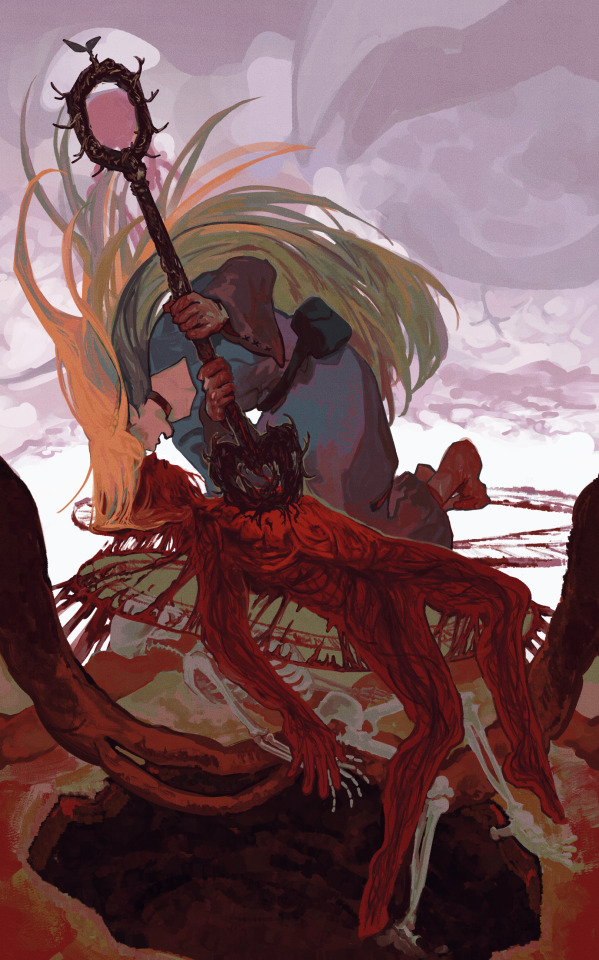
dragon meat, you, and me
#marcille donato#falin touden#farcille#dungeon meshi#delicious in dungeon#tw blood#tw body horror#tw gore#as a normal farcille fan this revival has been on my mind since i first read it and getting to watch it is like yippee!!#like messy revivals are everything - the consequences that will haunt u for the rest of the time they are alive#the initial hopeful moments where it all seemed well but quickly descend to That not being the case - losing not only the bit of evidence#evidence that your dream may work out but also someone you deeply care about in the process… marcille my Beloved#ofc wholly thruout the journey - at the forefront of it - getting falin back was the most crucial point but so wuickly :(( it was lost#on the other end its crazy to think about the compoments of falin now - human - dragon (dungeon) - marcille’s magic and desperation#the food the crew cooked (digested) - she is made of many parts!!#also i did not realize how medical it feels to draw smth like this. i dont usually explore the inner parts or use a lot of blood#in my work so rendering everything and looking up refs it felt quite magical (?)#ruporas art
17K notes
·
View notes
Text

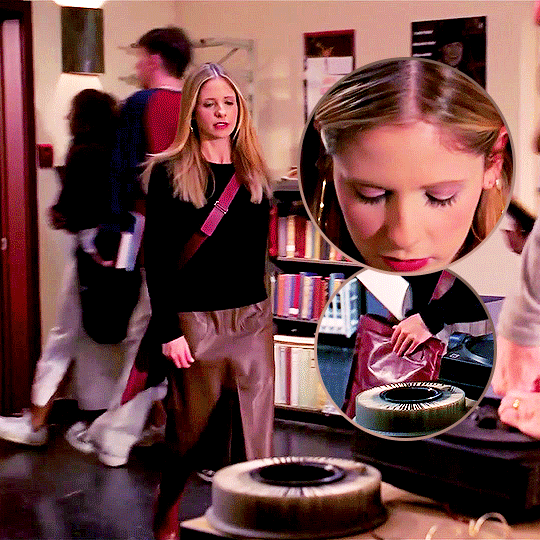


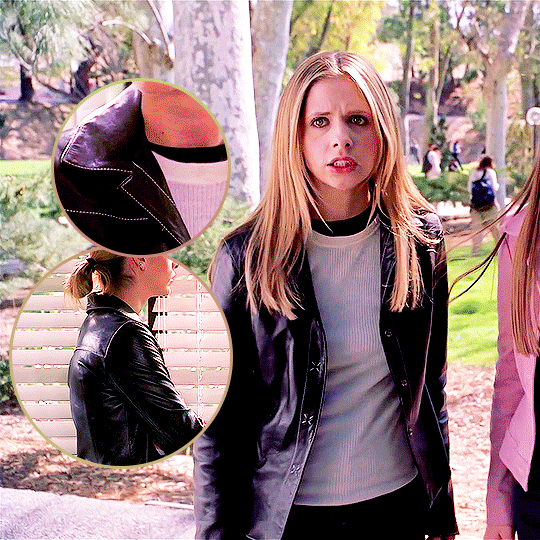
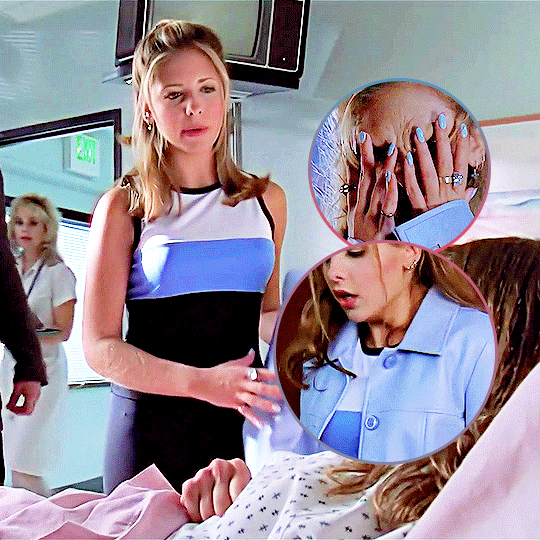
Buffy Summers + Outfits (1/∞)
#btvsedit#btvs#buffythevampireslayeredit#buffy the vampire slayer#creations#BTVSOutfits#buffy summers#buffysource#dailybtvs#slayerdaily#i LOVE buffy's wardrobe and i've been putting off starting to gif it#because she simply has so many lewks#and i was wondering if i should do the same as I did with the rest of the crew but just do like 's1 part 1' 's1 part 2' etc so i could fit#in all her best outfits#and then i thought it'd be more fun to just sort of go out of order and do more of a detailed series so i can zone in on the accessories to#so fun fact im just RNGing it for which episode to pick outfits from
498 notes
·
View notes
Text
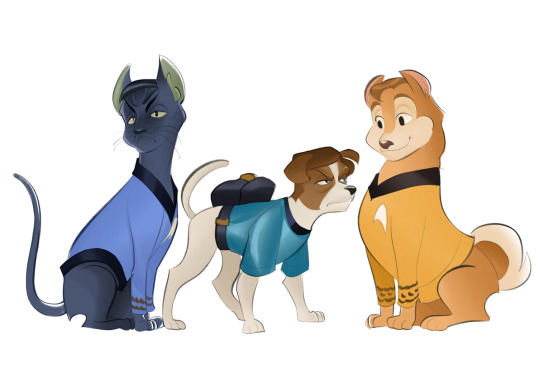
to BARKLY go where no PET has GONE BEFORE!!!!1!
#churro art#my art#digital art#doodles#fanart#star trek#star trek tos#star trek the original series#james t kirk#james kirk#spock#s'chn t'gai spock#leonard mccoy#bones mccoy#LIL DOODLE FROM TODAY HEHEHE#this is so random but I randomly got the idea of them as dogs#and i thought it would be funny if bones was a little angry dog#bones is a Jack Russell terrier while Kirk is a shiba in :D#and spock is a sphinx cat!!#i did think about doing the rest of the crew but Dios Mío my brain is so dead HAHAHA#i wish I was good at assigning dogs to ppl but alas I am not; T_T#abywassss back to hw LOL
853 notes
·
View notes
Text
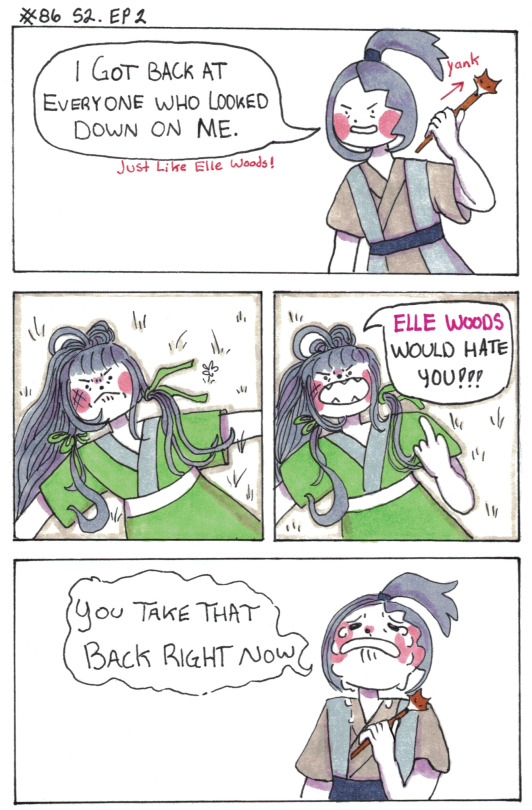
One last devastating blow
[First] Prev <–-> Next
#poorly drawn mdzs#mdzs#xue yang#A-qing#elle woods#THIS comic idea has been floating in my head for ages#apologies for the tonal whiplash but I had to do it.#I meant it when I said Elle Woods would return. She’s canon to the PD-MDZS universe now.#Xue Yang unfortunately got the wrong message out of Legally Blonde. The Classic Wuxia Theatre story.#I gotta say...A-qing has rocketed up my list of faves. As she deserves.#Everyone say ‘thank you’ to A-Qing for being the best. Rest in Vengence queen.#The greatest crime Xue Yang did was taking our queen of insults tongue away.#The call back to Song Lan not having the vocabulary to hurl harsh words at XY vs A-Qing dishing it out freestyle!!! SO GOOD#and so wwx’s empathy ends.#Yi-city was such a tragedy....Time to see what the crew does with all this information.
984 notes
·
View notes
Text
This is exactly how I remember Darkrai's fight at Dark Crater in PMD: Explorers.
(Bless the Snapcube fan-dub)
#I had so much fun animating this.#Uaargh the brainrot is not stopping#my art#my stuff#tagas friend spoiler#magmortar#darkrai#pmd darkrai#chimchar#totodile#pmd eos#pmd#pmd2#pokemon mystery dungeon#pokemon#I must say I did have the desire to add dusknoir and grovyle laughing in the background but ugh i did go for one of the Darkrai crew becaus#the other two simply would have not fit for this scene :(#But I still have some future trio doodles lying around so I want to post those soon as well but in a batch which isn't completely done#anyways hope you have a wonderful rest of the day :D!#should I tag this as animation?#ugh why not#animation#animatic#sorry cresselia did not make it in here...#actually i really wanna draw her more
59 notes
·
View notes
Text
in my dream last night they released a bill cipher themed soda called Decipher and I tried to go get some but insane wacky nonsense kept interrupting me before I could. I mean the nonsense had to do with the plot of the rest of the dream but it just kept showing up at the exact moment that I was about to get my soda. Ive just remembered the plot of the rest of the dream was that all of the straw hat piratds were there at tbis theme park we were in and some other group of pirates were trying to bully nico robin. the other pirate group was goth btw. their captain almost died from getting splashed with acid (by nico robin) (it was justified). But I didnt see that happen bc really I was mostly focused on getting my dumb soda.
#dream journal#yeah oh my god it was like. a one piece pre timeskip filler episode was happening at the same time as the rest of my dream. wild#and I was a part of the straw hat crew??? or friends with them or something???? i kept getting lost th#oh my god was i zoro. was i fucking zoro. i dont remember seeing zoro was i zoro and i didnt realize it??? help#zoro wants that stupid bill cipher soda . god damn it i remember wondering if it was alcoholic i think i was zoro and didnt even register#im lsoing it thats so funny. usually when im a character in my dreams i like. Know It. but being zoro didnt feel any different I guess 😂😂#god no there were definitely parts where i was me or i tjought i was me. and my irl friends wer ethere also.#i guess it was one of those dumb fading in and out things that happens in dreams sometimes#it did kinda feel like i was having two dreams at once#still i dont think i ever registered that anything was different when i was zoro so thats really fucking funny#and there was this whole 3rd plot line with made up people i dont know irl or from fiction.#it was kind of like sky high but completely different and with less white people...gah i dont rlly rember
66 notes
·
View notes
Text


(Shackleton’s Boat Journey by Frank A. Worsley)
#and the ‘idea’ of course was kicking Worsley in the head#i love this guy#frank worsley#frank ‘sleeps like the dead’ worsley#wuzzles#Shackleton’s boat journey#i love this book#book rec#the endurance#polar exploration#endurance expedition#lionel greenstreet#alexander macklin#alfred cheetham#thomas mcleod#polar explorer fanart#polar history#polar explorers#my drawings#wip wednesday#technically a wip because i did plan originally to have this be at least three panels#but i haven’t yet summoned up the wherewithal to attempt drawing the rest of the boat crew#and this (unfinished) panel kept cracking me up#so this may remain unfinished#for a while at least
53 notes
·
View notes
Text
I opened my lunchbox today to find a mouse busily eating my cheezits and that’s kind of how things are going right now
#i’m not over it#bro my cheezits#he absolutely freaked out while I just watched him run around and was like buddy how did you even get up here?#anyway he’s a pipefitter now#he’s taking break with us and he’s sharing my food so I guess he’s on the crew#i did eat the rest of my lunch#not the cheezits#but like everything else was sealed I checked#on a construction site a mouse is relatively one of the cleaner and less carcinogenic things you can find#is this real life?
28 notes
·
View notes
Text
Thinking about the concept of Sanji rolling up to Wano well-dressed and doing his best "I'm fine" act and Zoro immediately knowing he's injured and where just by the way that he moves and stands.
#one piece#black leg sanji#roronoa zoro#wings of the pirate king#wci arc#wano arc#idk something where chopper only mentions the bullet wound on his arm but zoro can tell he also has badly bruised ribs if not broken#and Who did that. he just wants to talk#and he won't roll his sleeves up so something is wrong with his wrists#and there's no time to talk about it but the rest of the crew clearly doesn't know and that makes zoro Concerned
30 notes
·
View notes
Text

#one piece#sanji#black leg sanji#everysanji#sabaody archipelago#ch499#ft. usopp#ft. franky#i wasnt going to include them originally but then i did. so franky is a bit cut off#anyway i did actually stop to read the celestial dragon confrontation this chapter...idk what it is#but it just gets to me when i think about it. oda really did a good job showing just how...#hmm. superior. ruthless. entitled they feel to everything from everyone#and builds on zoro's character and by extension the rest of the crew as people who help strangers/the underdogs#anyway idk i thought it was a poignant scene.
37 notes
·
View notes
Text
Sometimes I think about Dominik Koudelka's assistant who takes Minkowski's call in Ep43 Persuasion...
In the moment, dismissing the voice on the other end of the phone feels like the right thing to do. She can't just put any random person who calls through to Mr. Koudelka immediately; if she did, there would be no point in him having an assistant at all. And when that random caller is claiming to be Mr. Koudelka's dead wife, of course it would be wrong to subject him to that. (Cont. below cut)
She's seen Mr. Koudelka in the denial stage of grief, if only from a professional distance. She knows that the only time he took off after he heard the news was the day of his wife's funeral. She knows he started working days so long it was a wonder he got any sleep at all. She's heard rumours that he tried to insist that The Times' coverage of the shuttle crash ought to use the word 'allegedly' more. Apparently he ignored every sensitively-worded inquiry about whether he wanted to have any input on his wife's obituary.
Mr. Koudelka certainly doesn't need some cruel joke reopening emotional wounds. It's better not to mention it to him. His assistant knows that she did the right thing.
Or at least, she thinks she did. But she still can't stop thinking about that voice on the other end of phone, its desperation, its sense of urgency, its bizarre impossible claim.
So maybe she finds herself looking up Renée Minkowski, just to set her mind at ease. And there's surprisingly little information out there, but she eventually finds a clip of an interview from just before the launch of the Hephaestus mission. And that's when her stomach drops. She recognises the voice in the video. It's the same voice as the one she heard on the end of the phone. She's sure it's the same voice.
And what is she supposed to do then? Go to her boss and tell him that his wife is alive? Tell him that she lost him potentially his one chance to talk to his presumed dead wife? Admit that she didn't tell him about that call straight away? She's got no proof, just her memory. What if she's wrong about it being the same voice? Maybe it was a good impersonator, or a technological trick, or the power of suggestion. Is telling him the truth worth risking her job for? Is it worth risking giving false hope to a widower who has only just begun to move on? What if he doesn't believe her? What if he does?
#Wolf 359#w359#Dominik Koudelka#Renée Minkowski#Renee Minkowski#Personally I imagine that Koudelka's assistant didn't ever tell him about that call#because how can you tell someone something like that?#but if she did#there is some very interesting potential in terms of how he might react to that#which I'm sure other people have explored probably#In terms of thinking about Koudelka not taking time off#after hearing that his wife was dead#Minkowski is the kind of person who works super hard to avoid her feelings#so I think Koudelka would be similar#Thinking about when Gabriel Urbina said that before she left. Minkowski made Koudelka promise#that he would only worry about her for 10 minutes a day#and that he would be busy doing stuff the rest of the time#What can he do with that promise once he thinks she's dead?#I'm wildly inconsistent with how much I care about Minkowski and Koudelka's marriage#When I think about it in relation to the Hephaestus crew found family and their return to Earth#I'm like 'get in line Dominik. Renée's got new priorities now.#Deal with it or go away.'#But when I think about how Dominik Koudelka is someone who loved (and was loved by) Renée Minkowski#and didn't want her to go to space for two years but let her go#because it was her dream and anyway he couldn't stop her if he tried#and then he thought she'd died out there#and Minkowski tried to speak to him from 8 lightyears away but her words never reached him...#then I'm like 'oh actually I can care about this unvoiced character'#wolf 359 spoilers#w359 spoilers
75 notes
·
View notes
Text
i've seen people say that "zoro would kill a crew member if luffy asked him to" and it's so fucking out of character it almost makes me scream and throw up. thank you very much. now shut the fuck up.
#did you not fucking watch water 7 my guys#or like any other arc tbh#zoro might be loyal and devoted to his captain but he's not a fucking idiot#if luffy says something stupid or irrational he's gonna say it loud and clear and stop him#because that's literally his work as first mate#i'm so sick of people reducing zoro's character to either being gay for luffy or being an edgy swordsman#he has a personality y'know#also people be saying this as if his loyalty towards luffy made him unable to love the rest of the crew#they're his family you fucking idiots he would never hurt them i am VIOLENT#stop the zoro mischaracterization PLEASE#roronoa zoro#monkey d luffy#zolu#one piece
124 notes
·
View notes
Note
HELLO i am new to this whole tumblr thingy but for the drawing prompt thing..... some skypaul? 👀 perchance? (also im nervous so anon it is 😭)
you may be new to tumblr BUT I DONT THINK YOURE NEW TO MY BLOG IF YOURE ASKING FOR SKYPAUL. 😭😭😭 anon sankyu. i will forever draw skypaul forever and always

#kept it b/w cuz I don’t feel like doing sky’s. whole. shebang rn#I WUV THEM THO !!!! MY DADS FR#context is that rest of the crew is in a little battle rn#sky’s like welllll. they have it under control. tea party date? 🥺#and paul is like. sky. you cannot be FR rn#tbf they did have it under control tho…… so like#if you wanted smth more lovey dovey feel free to send in another ask btw HAHAHA#skypaul#ashipiko draws ♪#ashi’s asks ♪#a3!#a3#a3 art#a3! art#a3! fanart#a3! kazunari#kazunari miyoshi#miyoshi kazunari#a3! misumi#misumi ikaruga#ikaruga misumi#Captain Sky’s Pirates!#me when I’m CRAZY
21 notes
·
View notes
Text
i hate him hope he dies

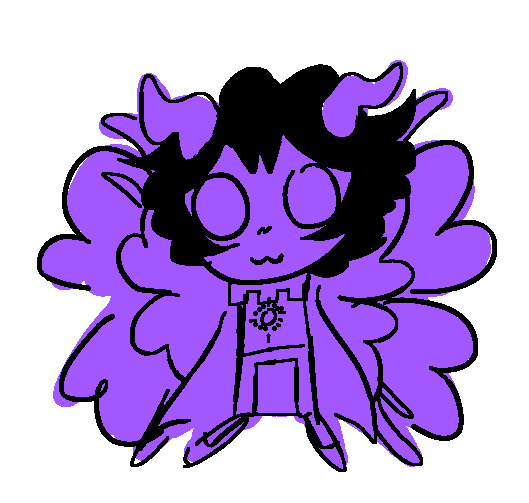
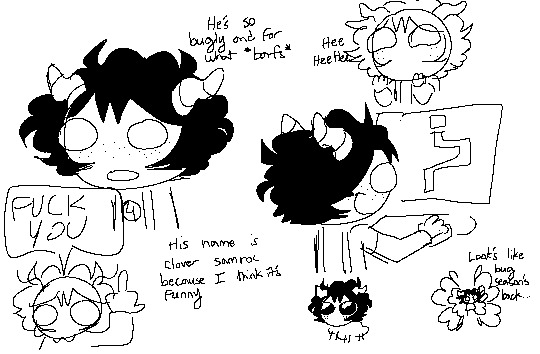
#i don’t hate him he’s really fun to draw#his horns are so difficult though why did i make them like that#i should probably resprite the first one ( i’m noticing atleast one small mistake ) but ummm i don’t want to#fire emoji fire emoji fire emoji#aquared homestuck au where the midnight crew are the kids and there are some other guys too i think#homestuck#homestuck au#homestuck fantroll#clover 04#not gonna tag the felt because its just him#fuck you the felt#i’ve been back posting on tumblr for like more than a week and i still do not know how to tag#houuugh#i still need to make the other guys rest in pieces fly high#also is the first one really low quality or is it just my end 😭
65 notes
·
View notes
Text
In a World Without Heroes: deleted scene
Author's note: The Saturday morning interview scene between Grantaire and Enjolras in chapter 8 originally started from Grantaire's arrival and was intended to go through the events of the scene that has since replaced it. This scene ended up being replaced partly because the characterizations weren't panning out how I wanted (as you see by the end) and partly because it was dragging the scene/fic. Yes, it was good background for the reader, but ultimately (as Grantaire now comments in the replacement scene) this is the same thing Enjolras would have said in every interview since his release from prison, so it didn't make sense for Grantaire to be acting like he'd never tuned in for any of Best Boy's television interviews.
Anyway, I'm finally sharing it here because it's the backstory behind Mabeuf's Manhattan Autonomous Zone and Enjolras's arrest, and also I've been meaning to for uhhhhh two years. Enjoy.
By the time Grantaire texts that he’s on his way, Enjolras feels very nearly relieved.
He’d spent Friday evening catching up on what little cleaning has been neglected since the last time he had a guest — that is to say, since moving in — specifically in order to sleep in Saturday morning, only to find himself wide awake at 9AM with little to do but anticipate the events of the day.
“Hey,” says Grantaire when Enjolras lets him into the building. He’s dressed down from how he usually is at the correctional facility but up from what he wears at the Chinese restaurant, which makes Enjolras feel better about his choice in clothes today.
“Do you mind walking? I’m on the fourth floor.”
There’s hesitation, and Enjolras thinks Grantaire may be about to protest, but when he speaks it’s to say, “Yeah, sure. I haven’t had a leg day in a while.”
“You work out?” asks Enjolras, surprised.
“Nope. Lead the way.”
The walk occurs in silence except for their heavy breathing and a quick apology when someone coming down from the third floor brushes past, and then they’re at the door to Enjolras’s flat.
“Make yourself at home,” he says, heading for the kitchen. “Would you like anything? Tea? Water?”
“Seltzer if you’ve got it, water if you don’t.”
Seltzer. It’s what Grantaire has ordered both times they were out, too, and Enjolras makes a note that he should pick some up beforehand if they do this again.
There’s no reason for them to do this again, of course: with this past week’s interview completed, they’re over halfway finished with the collaborative part of the book, and there will be no reason for them to be spending time with one another anymore. Even with Enjolras’s resolution not to pursue a relationship with Grantaire, the prospect of their burgeoning friendship coming to a halt with the end of their professional correspondence makes Enjolras’s stomach twist.
He re-enters the living room with two waters, placing one on a coaster in front of Grantaire and sipping the other for something to do.
“Thanks,” says Grantaire belatedly. His eyes have been wandering around the flat since Enjolras’s return, and Enjolras wonders what he’s looking for. At last, his attention falls back on Enjolras. “You’re dressed different.”
Enjolras lets his eyebrows quirk in feigned surprise and glances down at himself as though he hadn’t spent fifteen minutes lingering over the decision that morning. When he was merely a law student and the point person for a far-left branch of a tutoring group, Enjolras had had a lot more flexibility in what he wore; since his release from prison, however, his wardrobe has become a rotation of the same six white dress shirts, three tones of neutral trousers, and the occasional matching suit jacket. Even on days when he isn’t working in some capacity or another, Enjolras finds himself dressing as inoffensively as possible in anticipation of someone’s inevitable recognition and the associations to follow. His attire hadn’t been particularly flamboyant before then, but his use for his green rally shirts and blue cozy clothes has certainly fallen to the wayside since.
Today, after nearly five minutes of deliberation, he had settled on a pair of gray-ish jeans, a pale red undershirt, and a blue fitted shirt he’d nearly forgotten that he owned. At the last second before he’d gone down to meet Grantaire Enojlras had pulled a white hoodie over, but already he feels himself overheating in the extra layer.
“Yes, well,” he shrugs, realizing that he should sit and taking the armchair on the far side from where Grantaire has seated himself, “I don’t need to leave today, so I can dress down.”
“That’s what it is! I haven’t seen you in jeans and a shirt without a collar since you got out.” Grantaire’s eyes suddenly narrow. “You aren’t wearing a collared shirt under that, are you?���
Despite his discomfort, Enjolras snorts. “I’m not.”
“I don’t know that I believe you.”
“My deepest condolences.” His retort is met with crinkling at the corners of Grantaire’s eyes before they divert altogether as his attention turns to his lap. Enjolras clears his throat. “I’m not sure I’ve ever seen you in purple. It looks nice.”
Glancing back up, Grantaire’s brows furrow as he looks over his clothes.
“The scarf,” Enjolras clarifies.
The outermost layer of the sheer material is picked up and rubbed under close scrutiny between Grantaire’s fingers. “I guess? I thought it was gray when I grabbed it this morning, but in this lighting it looks blue to me.”
The scarf is definitely purple, but it isn’t worth disputing. “It looks nice,” Enjolras instead repeats.
“Well cree, thanks.”
Taking a deep breath, Enjolras decides to put an end to the stall tactics. “The interview, then? How do you want to do this?”
“Uh. I was thinking just kinda like at the facility? You say what you want, and I respond and ask questions as they arise. Obviously no notetaking or recordings or anything, so it’ll pretty much be like a normal conversation that I know some of the answers to already.”
Nothing about it feels like a normal conversation, but Enjolras braces himself nevertheless. “Let’s begin, then.”
“You sure?” There’s a dubious crinkle between Grantaire’s eyebrows. “We can shoot the shit for a while longer if you want, let you get comfortable and whatnot.”
Resting his hands carefully over his knees, Enjolras arranges his features into a neutral façade. “I’m sure.”
Grantaire sighs deeply, a hand skating over his scarf and jerking the front back from his hairline as he scratches the back of his head. “Okay then. Well, where would you say it all started?”
He’s about to fall back on the polite clarifying tactics he’d been drilled on for televised interviews before when he realizes that he doesn’t have to. “Where what all started?”
Apparently Grantaire holds a similar amount of compunction toward his professionalism. “I dunno, whatever you want. The rally? Broletariat? Activism in general?”
Enjolras has managed to avoid shining a spotlight on his childhood this long, and his parents have made it clear that they have no interest in having their names attached to any of this, but beginning at the rally would feel like starting a sentence in the middle of a phrase. “Combeferre, Courfeyrac, and I have known each other since we were young,” he says, finally settling for their indoctrination to the betterment of humanity as a promising starting place, “and we all were accepted to and attended Columbia for undergrad and stayed for our graduate degrees. None of us were from New York City, and while we were studying, we saw a need in the local community for support, and we started up an afterschool tutoring group in conjunction with Barnard College’s urban teaching program. I believe they’re still running, though I lost touch with them while I was away.”
“On the road,” nods Grantaire.
“In jail.” There’s no use dancing around it now: if Enjolras can’t say it in front of Grantaire, who else is there?
“Right, that too.” Grantaire’s body is draped over the corner of Enjolras’s couch casually enough, but there’s a stiffness in his posturing and the way he rubs the tip of his thumb back and forth along the side of his index finger that makes Enjolras think he’s uncomfortable.
“The Broletariat’s inception was nearly accidental,” he continues. “Feuilly worked in the afterschool program at one of the schools we operated out of, and we got to discussing education law one day while he was packing up and I was waiting on a pupil and agreed to continue the conversation as a secondary location at a later date. It was never official, but it did become regular: once work and classes let out, more and more of us met under the guise of lesson planning or studying or spending time with friends, while under it all we were organizing.”
“Organizing what?”
Enjolras shakes his head. “At the time, we’d had no way of knowing. We could feel unrest building toward something, and we made sure that the channels of communication were open and to keep up with the news and share resources and to — to be prepared for any eventualities,” he says.
“Enjolras, I was there.”
“It occurs to me that announcing our weapons stores to the general public may not go over well.”
“Good thing you’re not announcing it to the general public, then.”
Enjolras sighs. “We were ready for anything, and one day, ‘anything’ finally had a name: Jean-Charles Mabeuf.
“Before his arrest, Mabeuf had been a churchwarden at a local church, a respected member of his community. His friends said he had an expansive collection of books and was trying to grow indigo to start a small business.”
“Does indigo grow well in New York City?” This time, it seems like a question Grantaire genuinely doesn’t know the answer to.
“Evidently not. At the time of his arrest, he was several months behind on rent, had nothing in his fridge, and his famous book collection had dwindled to hardly anything: he was destitute.”
“Tough break.”
Enjolras shoots a sharp look at Grantaire. “Do you remember what happened to him?”
“The prison left him to die of treatable causes, what more is there to know?”
“His landlord took him to court for the missing rent; Mabeuf had already fallen ill and couldn’t make it, and the judge issued a bench warrant. He was arrested for being sick and poor.”
“Well, I’m seeing why I would selectively have culled that bit if I heard it.”
Enjolras feels his nostrils flare at the flippancy, but a small part of his mind reminds him that the Grantaire in front of him is not the Grantaire who drank his way through the entire rebellion and every strategy meeting leading up to it. “I would be surprised if you hadn’t: his arrest hardly made the news. I’m told that his church was in the process of arranging some care package or another for him, but that most likely would have been the end of it if not for the pneumonia.”
Now comes the part that the news and everyone knows: all of the symptoms were recorded upon his intake, but no action was taken to treat him. Mabeuf remained in jail as he waited for his new court date, complaining every day of chest pains and requesting to be moved to the med pod. He was never moved, and on 1 June, at eighty years old, Jean-Charles François Mabeuf was found dead in his cell.
“With the release of the coroner’s report, his church community took to the web for Justice for Mabeuf. The movement against the privatized prison system had already existed and was merely on the backburners, and it seemed like the time for change had finally come.”
“Okay, so wait,” Grantaire interrupts. “I was a bit hazy on the details at the time, but I mostly chalked that up to a whole slew of substances combined with a complete and manufactured sense of total apathy; as it would turn out, I am still just as confused.”
Enjolras leans back expectantly in his seat. “About?”
“A couple of points, honestly, but mostly what an armed splinter from a tutoring club expected to happen.”
A fair question. “I was supposed to go into education law.”
Grantaire blinks. “Okay?”
“There’s no special concentration in legal programs to choose one’s specialization: you take the relevant courses offered, intern with firms that handle the sorts of cases you’re interested in, and once you pass the bar, pursue that area.”
“Got it.”
“Once you start looking into the way the United States education system is set up, it becomes immediately evident how inextricably linked all of these pieces are: children are born in low-income communities. Low income means that the property taxes that fund the schools amount to less, leading to fewer resources and higher drop-out rates. The wages in positions for unskilled labor aren’t enough to live on, so people either pick up more and more jobs until they’ve worked themselves to the bone and, quite often, to the point of their bodies breaking down, at which point the failings of the health system become painfully apparent; are turned out onto the streets, which exposes the failings of our government’s housing system and its rotting capitalist firmament; or turn to more lucrative but less legal job opportunities.
“Two of these are arrestable offenses disproportionately targeted communities of color, and the third skips past those steps directly to killing the dime-a-dozen wage slave.”
Grantaire stares at the coffee table in silence for long enough that Enjolras begins to suspect that he may not have been paying any attention at all before his brows finally furrow and he looks back up at Enjolras. “So what were you expecting to happen?”
He sighs. “I couldn’t rightly say what we expected to happen, but the goal was to draw national attention to any one of these points. If something gave, we thought that the whole system might crash down around it. Exposing the for-profit prison industrial complex as the corrupt, predatory, outdated, inherently racist system it is … it felt self-evident. The whole system is broken, let’s build a new one together that serves all of its citizens equally and doesn’t feature intentional loopholes for legalized slavery.”
Grantaire is quiet for a long time before he finally asks, almost too quietly for Enjolras to hear, “When did you realize it wasn’t going to work?”
‘When’ indeed. Enjolras makes no motion to answer. When had he known? Has he ever known? Perhaps he still doesn’t. “It still might,” is what he finally says. “We haven’t failed yet.”
Grantaire looks affronted. “You almost died, Enjolras.”
“I didn’t."
#in a world without heroes#shitposting sometimes writes#you can see why it got cut/rewritten#and I'm all for an iceberg#but it did annoy me that I couldn't find any natural way to explain how the MMAZ worked#oh I guess it still isn't addressed here#but there were a couple of meet-up points around the island that people were gathering#and they were all going to meet and converge on the [courthouse?] way way south of the island aka the location of MMAZ#but riot police and national guard ended up heading off all of the routes (I had a specific choke-point noted in my outline somewhere)#so the crew that was already at MMAZ ended up getting strangles without reinforcements or resources#and then the waves of tear gas and rubber bullets started#and the rest is IaWWH canon
14 notes
·
View notes
Text
York: Dinosaurs aren't extinct. I mean, Wyoming is walking in this room
Wash: *wheeze*
#oh Wyoming was NOT happy#“I'm 27 you wanker!”#York had the good fortune to say it at dinner with the rest of the crew#and holy shit did they torment Wyoming about it for months#South's mocking Wyoming? North comes in with a “South respect your elders”#they were on shore leave? “Hey Wyoming can those old bones of yours tell if a storm is coming?”#even FLORIDA joined in#Wyoming felt so betrayed 😔#it got to the point where if you didn't have access to Wyoming’s files he was the grouchy old man#ah good times#well not for Wyoming#agent york#agent washington#rvb#red vs blue#inccorect quotes
101 notes
·
View notes